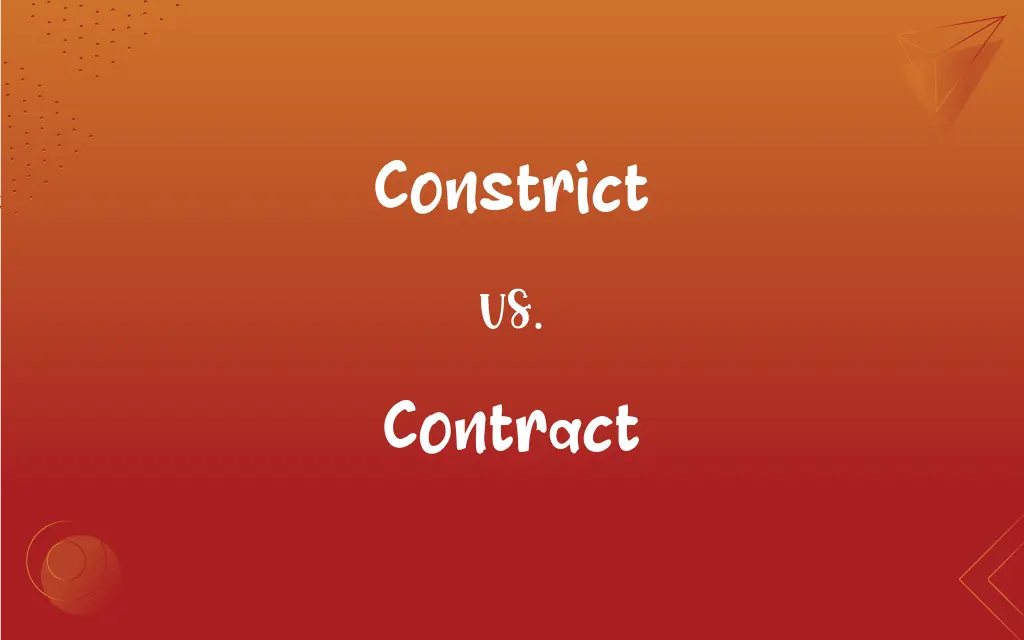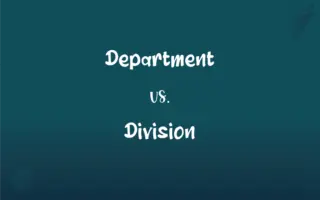Constrict vs. Contract: What's the Difference?
Edited by Aimie Carlson || By Janet White || Published on November 22, 2023
"Constrict" means to tighten or narrow, usually referring to physical objects, while "Contract" generally refers to decreasing size, length, or becoming more compact, or legally binding agreements.

Key Differences
"Constrict" typically implies a force that causes something to become tighter or narrower, often exerting pressure. For example, a snake constricts its prey. In medical terms, blood vessels may constrict, limiting blood flow. "Contract," on the other hand, has a broader application. Muscles contract during exercise, becoming shorter and tighter. It's a more general term for the process of becoming smaller or shorter, not necessarily due to external pressure.
"Constrict" often carries a sense of restriction or limitation, particularly in physical contexts. When something constricts, it often hinders normal movement or function, like constricting clothing. "Contract," however, is often neutral or even positive in physical contexts, like when pupils contract in bright light, a natural and necessary response. But "contract" can also refer to entering into a legal agreement, which "constrict" does not cover.
The term "constrict" is less common in everyday conversation and is mostly used in specific contexts like medicine or descriptions of physical restriction. It's rarely used metaphorically. "Contract," however, appears frequently, applicable in various contexts from legal (contract a deal) to physical changes (contract a muscle) and even diseases (contract an illness), showcasing its versatility.
"Constrict" is more about the process and effect — the act of tightening and the state of being tightened. It doesn't imply any agreement or deal but a physical change. "Contract" can signify a process, like when a substance contracts as it cools, but it's also about the result: a legal document, a contracted illness, a muscle's state post-contraction.
In linguistics, "constrict" isn't used as a term, but "contract" can refer to the shortening of words or syllables. The latter is part of language evolution, where long phrases contract into shorter ones for efficiency. This linguistic meaning of "contract" illustrates its thematic consistency: a reduction in size or length.
ADVERTISEMENT
Comparison Chart
Definition
Tighten or narrow
Decrease size; legal agreement
Usage
Specific/medical contexts
Versatile: legal, physical, etc.
Implication
Restriction/limitation
Reduction, agreement, illness
Commonality in Speech
Less common
Common in various contexts
Linguistic Term
Not used
Refers to word shortening
ADVERTISEMENT
Constrict and Contract Definitions
Constrict
To draw together; tighten.
Her anxiety made her throat constrict.
Contract
To become affected with (an illness).
She contracted the flu last winter.
Constrict
To restrict the freedom or movement of.
The snake constricted its prey.
Contract
An agreement between two or more parties, especially one that is written and enforceable by law.
Constrict
To slow or impede by pressure.
Blood flow constricts with cold.
Contract
The writing or document containing such an agreement.
Constrict
To limit or bind tightly.
His chest constricted with pain.
Contract
The branch of law dealing with formal agreements between parties.
Constrict
To make smaller or narrower by binding or squeezing.
Contract
Marriage as a formal agreement; betrothal.
Constrict
To squeeze or compress.
Contract
The last and highest bid of a suit in one hand in bridge.
Constrict
To restrict the scope or freedom of; cramp
Lives constricted by poverty.
Contract
The number of tricks thus bid.
Constrict
To become constricted.
Contract
Contract bridge.
Constrict
(ambitransitive) To narrow, especially by application of pressure.
Contract
A paid assignment to murder someone
Put out a contract on the mobster's life.
Constrict
To coil around (prey) in order to asphyxiate it.
Contract
To enter into by contract; establish or settle by formal agreement
Contract a marriage.
Constrict
(figurative) To limit or restrict.
Contract
To acquire or incur
Contract obligations.
Contract a serious illness.
Constrict
To draw together; to render narrower or smaller; to bind; to cramp; to contract or cause to shrink.
Such things as constrict the fibers.
Membranous organs inclosing a cavity which their contraction serves to constrict.
Contract
To reduce in size by drawing together; shrink.
Constrict
Squeeze or press together;
She compressed her lips
The spasm contracted the muscle
Contract
To pull together; wrinkle.
Constrict
Become tight or as if tight;
Her throat constricted
Contract
(Grammar) To shorten (a word or words) by omitting or combining some of the letters or sounds, as do not to don't.
Constrict
To become narrower.
The path constricted as they progressed.
Contract
To enter into or make an agreement
Contract for garbage collection.
Contract
To become reduced in size by or as if by being drawn together
The pupils of the patient's eyes contracted.
Contract
An agreement between two or more parties, to perform a specific job or work order, often temporary or of fixed duration and usually governed by a written agreement.
Marriage is a contract.
Sign a contract
Write up a contract
Read a contract
Countersign a contract
Legally-binding contract
Unwritten contract
Contract
(legal) An agreement which the law will enforce in some way. A legally binding contract must contain at least one promise, i.e., a commitment or offer, by an offeror to and accepted by an offeree to do something in the future. A contract is thus executory rather than executed.
Contract
(legal) The document containing such an agreement.
Contract
(legal) A part of legal studies dealing with laws and jurisdiction related to contracts.
Contract
(informal) An order, usually given to a hired assassin, to kill someone.
The mafia boss put a contract out on the man who betrayed him.
Contract
(bridge) The declarer's undertaking to win the number of tricks bid with a stated suit as trump.
Contract
(obsolete) Contracted; affianced; betrothed.
Contract
(obsolete) Not abstract; concrete.
Contract
(ambitransitive) To draw together or nearer; to shorten, narrow, or lessen.
The snail’s body contracted into its shell.
To contract one’s sphere of action
Contract
(grammar) To shorten by omitting a letter or letters or by reducing two or more vowels or syllables to one.
The word “cannot” is often contracted into “can’t”.
Contract
(transitive) To enter into a contract with. en
Contract
(transitive) To enter into, with mutual obligations; to make a bargain or covenant for.
Contract
(intransitive) To make an agreement or contract; to covenant; to agree; to bargain.
To contract for carrying the mail
Contract
(transitive) To bring on; to incur; to acquire.
She contracted the habit of smoking in her teens.
To contract a debt
Contract
(transitive) To gain or acquire (an illness).
Contract
To draw together so as to wrinkle; to knit.
Contract
To betroth; to affiance.
Contract
To draw together or nearer; to reduce to a less compass; to shorten, narrow, or lessen; as, to contract one's sphere of action.
In all things desuetude doth contract and narrow our faculties.
Contract
To draw together so as to wrinkle; to knit.
Thou didst contract and purse thy brow.
Contract
To bring on; to incur; to acquire; as, to contract a habit; to contract a debt; to contract a disease.
Each from each contract new strength and light.
Such behavior we contract by having much conversed with persons of high station.
Contract
To enter into, with mutual obligations; to make a bargain or covenant for.
We have contracted an inviolable amity, peace, and lague with the aforesaid queen.
Many persons . . . had contracted marriage within the degrees of consanguinity . . . prohibited by law.
Contract
To betroth; to affiance.
The truth is, she and I, long since contracted,Are now so sure, that nothing can dissolve us.
Contract
To shorten by omitting a letter or letters or by reducing two or more vowels or syllables to one.
Contract
To be drawn together so as to be diminished in size or extent; to shrink; to be reduced in compass or in duration; as, iron contracts in cooling; a rope contracts when wet.
Years contracting to a moment.
Contract
To make an agreement; to covenant; to agree; to bargain; as, to contract for carrying the mail.
Contract
Contracted; as, a contract verb.
Contract
Contracted; affianced; betrothed.
Contract
The agreement of two or more persons, upon a sufficient consideration or cause, to do, or to abstain from doing, some act; an agreement in which a party undertakes to do, or not to do, a particular thing; a formal bargain; a compact; an interchange of legal rights.
Contract
A formal writing which contains the agreement of parties, with the terms and conditions, and which serves as a proof of the obligation.
Contract
The act of formally betrothing a man and woman.
This is the the night of the contract.
Contract
A binding agreement between two or more persons that is enforceable by law
Contract
(contract bridge) the highest bid becomes the contract setting the number of tricks that the bidder must make
Contract
A variety of bridge in which the bidder receives points toward game only for the number of tricks he bid
Contract
Enter into a contractual arrangement
Contract
Engage by written agreement;
They signed two new pitchers for the next season
Contract
Squeeze or press together;
She compressed her lips
The spasm contracted the muscle
Contract
Become smaller or draw together;
The fabric shrank
The balloon shrank
Contract
Be stricken by an illness, fall victim to an illness;
He got AIDS
She came down with pneumonia
She took a chill
Contract
Make smaller;
The heat contracted the woollen garment
Contract
Compress or concentrate;
Congress condensed the three-year plan into a six-month plan
Contract
Make or become more narrow or restricted;
The selection was narrowed
The road narrowed
Contract
Reduce in scope while retaining essential elements;
The manuscript must be shortened
Contract
To enter into a legal agreement.
She'll contract her first book deal.
Contract
To reduce in size by drawing together.
The metal contracted in the cold.
Contract
To incur, as a liability or obligation.
He contracted a large debt.
Contract
To pull together; to shorten or shrink.
His muscles contracted with effort.
FAQs
Can you "contract" a space?
Yes, in the sense of the space becoming smaller.
Does "contract" always refer to legal matters?
No, it can also mean to reduce in size, acquire an illness, or shorten.
Does "constrict" imply oppression?
It can, especially when used metaphorically.
Can a contract be "constricting"?
In a metaphorical sense, if it severely limits freedom.
Is "constrict" used in legal jargon?
No, "constrict" is more about physical limitation, not legal agreements.
Does "contract" imply formality?
In legal usage, yes, but not in its other meanings.
Can "contract" mean to agree on something?
Yes, especially in legal or formal contexts.
Can "constrict" be used for non-physical contexts?
Rarely, it's predominantly used for physical narrowing or tightening.
Is "constrict" related to "constraint"?
They share a root, both implying limitation or restriction.
Can "contract" refer to physical movements?
Yes, like muscles contracting.
Does "constrict" have a positive connotation?
Rarely, it's often about undesirable limitation.
Can "constrict" mean to limit options?
Yes, especially in a metaphorical sense.
Can "contract" be used in medical terms?
Yes, as in contracting a disease.
Can "contract" be involuntary?
Yes, like involuntary muscle contractions.
Can "constrict" refer to emotional responses?
It's possible, as in feeling constricted by fear.
Is "constrict" passive?
Not necessarily; it's the act and the effect.
Is "constrict" about pressure?
Often, it's about things being drawn tightly together, often by external force.
Can you "contract" obligations?
Yes, you can undertake obligations, often legally.
Does "constrict" suggest tightness?
Yes, it specifically implies tightening or narrowing.
Does "contract" have a directional implication?
It often implies inward movement or reduction.
About Author
Written by
Janet WhiteJanet White has been an esteemed writer and blogger for Difference Wiki. Holding a Master's degree in Science and Medical Journalism from the prestigious Boston University, she has consistently demonstrated her expertise and passion for her field. When she's not immersed in her work, Janet relishes her time exercising, delving into a good book, and cherishing moments with friends and family.
Edited by
Aimie CarlsonAimie Carlson, holding a master's degree in English literature, is a fervent English language enthusiast. She lends her writing talents to Difference Wiki, a prominent website that specializes in comparisons, offering readers insightful analyses that both captivate and inform.






































































